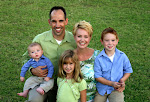While writing my post yesterday, I was reminded of an article I read months ago and have thought of often since. The story of a father and his son is particularly poignant, I think, because the idea that we are responsible to our children rather than responsible for our children is an important paradigm shift in how I raise, respond, and nurture my amazing kiddos. With that new understanding, I can parent without my own ego, baggage, or stuff getting in the way. I allow them to become the person God envisions, not the person I want them to be, and isn't that so much better?
So, for today, here's a little food for thought. Enjoy!
“One definition of good mental health is the ability to give up control—to trust God, ourselves, and others—and to know that things will work out,” observes Dr. Clyde Parker, clinical director of a counseling and therapy center at McKay-Dee Hospital in Ogden, Utah. Giving up control over other people may seem contrary to our responsibility to help others find salvation. But Dr. Parker explains that we need to see ourselves as being responsible to other people, not responsible for them. “Although we may be our brother’s keeper,” he says, “our brother still has responsibility for his own life.”
Thus, we accomplish most in our relationships when we focus more on what we can control—our own attitudes and behavior—and less on what we can’t control—the attitudes and behavior of the other person. We do the most good for our friends, spouses, and children when we concentrate less on controlling them and more on being available to them.
Letting go of the belief that we can control another person’s behavior does not mean that we cease to care about that person. Instead, it means that we trust that the Lord loves that person and knows better than we do how to help him. Our task then becomes being open to the Spirit’s promptings in our relationships.
One father tells of a time when he was alarmed that his son did not seem to take his studies seriously enough. One day, while reading his son’s patriarchal blessing, he felt an impression from the Spirit: “It’s all right. Your fears about making your son a good student are getting in the way of your relationship with him and his progress. He was first my son; his heart is good. He is in my hands. Let go.”
“Since that experience,” says the father, “I have felt more interested in my son’s life and more available to him than I was before because I am not constantly worried, checking to see whether he is meeting some standard. I still set guidelines for him, but I also watch—amazed—to see the marvelous person he is becoming.”
We also have more energy for doing good when we spend less time worrying about circumstances we can’t control or fearing the difficulties of life. Trusting in the Lord and his purposes frees us of many of the anxieties that can depress and paralyze us.
As the Apostle Paul promises: “Be careful [in the Greek, this means, ‘Be unduly concerned’] for nothing; but in every thing by prayer and supplication with thanksgiving let your requests be made known unto God.
“And the peace of God, which passeth all understanding, shall keep your hearts and minds through Christ Jesus.” (Philip. 4:6–7.)
As we leave our burdens of worry and fear with a trusted Father, we can feel peace even in times of uncertainty.
Written my Jan Underwood Pinborough for the Sept. 1990 Ensign. For the whole article go here.
Thursday, September 25, 2008
Subscribe to:
Post Comments (Atom)










5 comments:
Thank you!
I so totally agree with this!
I have always been really really big on my children being independent, and just guiding them in the right direction.
Thanks for this article!
And there it is. The answer to my silent prayers...
Thank you. I needed this today.
Great article. It definitely made me think.
So difficult to do but so necessary! Thanks for the awesome reminder.
Post a Comment